Torquay Boys' Grammar School
Torquay Boys' Grammar School is a selective boys grammar school in Torquay, Devon, England. As of January 2012, it had 1,113 students.[1] The school was founded in 1904 and celebrated its centenary in 2004. It has six houses named after famous British mariners.
| Torquay Boys' Grammar School | |
|---|---|
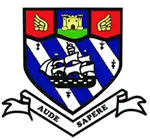 | |
| Address | |
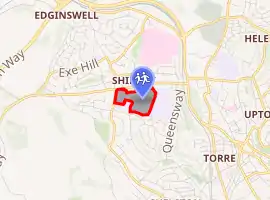
| |
Shiphay Manor Drive , , TQ2 7EL England | |
| Coordinates | 50°28′34″N 3°33′25″W |
| Information | |
| Type | Grammar school; academy |
| Motto | Aude Sapere Dare to be Wise |
| Established | 1904 |
| Specialists | Languages, Business and Enterprise |
| Department for Education URN | 136321 Tables |
| Ofsted | Reports |
| Chairman of Governors | Brian Wills Pope |
| Head teacher | Mr. P Lawrence |
| Gender | Boys |
| Age | 11 to 18 |
| Enrolment | 1,113 |
| Houses | Blake, Davys, Frobisher, Gilbert, Hawkins, Ralegh |
| Colour(s) | Blue /Red |
| Publication | Torquin |
| Website | http://www.tbgs.co.uk |
It is situated in Shiphay, south of Torbay Hospital, not far from the A3022 and Torre railway station as well as being directly next to Torquay Girls Grammar School.
History
The school was founded in 1904 as "The Torquay Pupil Teachers Centre", with premises in Abbey Hall, Rock Road. It opened its doors on 4 September 1904. The school, by now called "Torquay School", later moved to its new location in Barton Road, where it was established under its current name. The new School was later rebuilt on land purchased from Torquay Grammar School for Girls in 1982.
In 2004, the school received a new hall known as the Cavana Centenary Hall. (It was built by Mr Cavana).
The school currently occupies Shiphay Manor, a 17th-century manor with extensive parkland, known as 'The Paddock' (owned by the neighbouring Girls' School), used by boys in year 11 or above for recreation. The school is made up of a number of buildings: The Centenary Hall (used for charities and assemblies), Music Block (also houses the PE changing rooms), TBGS Languages Centre (where languages are taught; it is also home to a kitchen for teacher use), the D Block (used for Philosophy & Applied Ethics and Business and Enterprise), the Manor (used for Art and Media Studies), the Observatory (used by the astronomical society) and the main school building (used for all subjects otherwise.)
In September 2010, it gained Academy status.
In 2013, it was revealed that, after 43 years at Torquay Boys’ Grammar School, 27 of them as Headteacher, Roy Pike, the latest head of the school, had retired. He resigned as of December 2013 and wrote to the Governors and Trustees resigning his post as from December 2013. During the school's 2013 Prize Giving ceremony, he was elected to be the prize giver and gave a speech, commemorating his experiences with the school which ended with a 1-minute standing ovation. Pike is widely regarded as the school's greatest-ever ambassador. In his temporary replacement, Peter Lawrence was chosen to be acting head, for at least one whole academic year before becoming permanent headmaster in 2014.
The school hosts an annual prize-giving ceremony where many notable prize-givers have spoken over the years. Recently these have included Sir Ian Diamond, Graham Brady MP and Sir Steve Smith.
Buildings and Facilities
- Main School Building - Houses the Bistro (now known as the "Retreat"), Offices, Reception, Library, Sixth Form Block, Sports Hall, Science, Maths, English, Geography, History, ICT and Technology Classrooms.
- Manor - Art and Media Studies are taught there.
- Languages College - The school's languages are taught there (Spanish, French, German, Japanese and Mandarin) and it also houses a kitchen that teachers can use.
- Centenary Hall - Used for assemblies and some clubs. Can be hired out to the community.
- Music Suite and PE Changing Rooms- Music is taught upstairs and the PE Changing Rooms are downstairs, although the Sports Hall is situated inside the main school building.
- D Block - Philosophy & Applied Ethics and Business and Enterprise are taught here.
- Astroturf - A bottom astroturf used mainly for football and can be hired out to the community. The top astroturf is mainly used for football, tennis and basketball. Can also be hired out to the community.
- Playing fields - These are used for all sports and can not be hired out to the community.
Former teachers
- Arnold Ridley - between the wars- playwright and actor who played Private Godfrey in Dad's Army[2]
- John Granger, Headmaster from 1996-2009 of Bournemouth School (former Deputy Head of school)
- Robert Masters, Headmaster since 2004 of The Judd School (former Deputy Head)
- Barry Sindall, Headmaster from 1990-2008 of Colyton Grammar School, and Chief Executive since 2008 of the Grammar Schools Headteachers Association (former Deputy Head)
- Steve Margetts, Principal since 2014 of Torquay Academy (former Head of Davys House and Business, Economics and Enterprise)
Partnerships
The school is partnered with the neighboring Girls Grammar School (Torquay Girls' Grammar School) and Torquay Academy.
Observatory
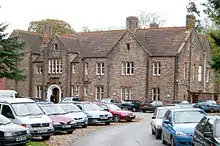
The school has its own astronomical observatory. Opened in 1989, it houses a 19.2" (0.5m) Newtonian reflector, and is used by the school itself, by the Torbay Astronomical Society, and is also regularly open to the public.[5]
The astronomer and broadcaster Sir Patrick Moore was a patron of the school and maintained close ties - Ralegh House even performed the premiere of his operetta "Galileo" in the late 1990s. Current presenter of the BBC television programme "The Sky at Night" Chris Lintott, who lectures at Oxford University, was also a student of the school.
Academic
The school consistently is among the best public examination results in Devon[6] and has become a candidate school which, as of academic year 2009-2011, will offer the International Baccalaureate as a sixth form examination option in addition to A levels.
The school has also performed well at national academic competitions; winning the UK Mathematics Trust and the Further Maths Network "Math Challenge",[7] finishing as runners up in the national quiz championship for schools[8] and finishing third in the Ogden Trust National Schools Business Competition,[9] to name but a few.
Nearly every student from the school goes on to study at university, with between ten and twenty students going to Oxford or Cambridge each year. The school has been ranked amongst the top 100 boys' schools of its type in the UK for some years.
House system
Upon joining the school, every student is assigned to one of the school's six houses.[10] The houses, consisting of around 25 pupils from a year group making a form group, compete in both academic and sporting disciplines to gain points in that year's House Championship. The Houses, of which six are currently in existence, are named after British seafarers.
In the sixth form, many lessons are shared with the neighbouring Torquay Grammar School for Girls, allowing students to benefit from female presence and each school's specialities. The sixth form have their own common room, where they are able to purchase food from 'Café Six' (a cafe run by the school, selling pre-made paninis, sandwiches and Aquajuice).
Blake house
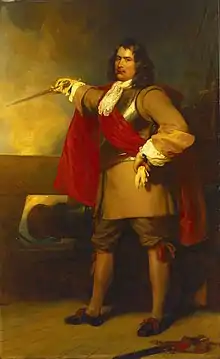
Blake House is named after Admiral Robert Blake (1599–1657); its house colour is blue.[11] As with all of the school's houses, Blake has a strong tradition of charity work. As well as the separately-run form activities, every December Blake House write, produce and perform a variety show for the Gateway Club, a local organisation that provides an opportunity for those with learning disabilities and their families and carers to interact with others and obtain information, guidance and support and also to advocate for the rights, needs and wants of its members, enabling greater integration and less segregation. At the end of the 2017/18 academic year, Blake retained their house championship for a third year running. Blake House was one of the original houses at TBGS. The current Head of House is Mrs A Kilpatrick.
Davys house
Davys House is named after John Davis (1543—1605); its colour is white.[12] .Formerly called Clifford House ( Circa 1950's).
"Friday Form Groups" or "Vertical Form Groups" that exist within Davys House form a unique atmosphere. This is where Pupils of the House are mixed into various years (contrary to the normal placement of a Tutor Group consisting of only one year, seen throughout the school) and assigned a teacher different from their normal Form Tutor. This event usually happens every Friday, but come together for special occasions such as the Away Day. This idea was initially implemented to enhance the relations between the various years in the school, thus creating a more well rounded and united House. However, since its introduction, the Vertical Tutor Group system has been used in competitions, allowing a more fair spread of ability than various years against each other.
The rivalry between the different Vertical Tutor Groups are kept on a leader board, where points are awarded for various competitions, how well the group does in school and on how much money they raise for the Davys House Charity, which the House still holds dear as one of its Main focuses and Goals. It has since become a tradition that prefects and any willing students are welcomed into contributing quizzes and competitions for Friday Forms, as well as for any other events and activities that may occur. The current Davys Head of House is Mr D Hore.
Frobisher house
Frobisher House is named after Sir Martin Frobisher (c. 1535 or 1539–1594).[13] It is the second-youngest of the current houses (splitting from the Ralegh House in 1994) and its house colour is yellow. Frobisher has narrowly missed out on winning the House Championship during the previous 5 years, the closest was in the 2004–2005 academic year when Ralegh pipped Frobisher to the post by just 1/4pt. It first won the House Championship in the 2010-2011 academic year when it beat second place, Hawkins House, by 15 points. In the 2017/18 academic year, it came second to Blake House, with the Frobisher Year 9 relay team beating the sports day record for a third year in a row, after beating it as the same team in both year 7 and 8.
The intake for the academic year 1993–1994 was increased to allow for the creation of an extra form group called 7 Frobisher-Ralegh. For the purposes of the House Championship, the form group was considered part of Ralegh, but otherwise it was a separate House under Mr J G A Palmer.
In the academic year 1994–1995, Frobisher became a truly separate house. Adjustments made because of the House's small size included Frobisher assembles taking place in the school library rather than school hall (until the academic year 1995–1996).
Frobisher have a long history of producing a show for the school. The current Frobisher Head of House is Mrs H Jones
Gilbert house
Gilbert house is named after Sir Humphrey Gilbert. (c. 1537–1583)[14] The house colour is green. England cricketer Chris Read was a pupil in Gilbert House, and was guest of honour at the opening of the school's new changing rooms. Gilbert is also known for its charity work, raising sums for Macmillan Cancer Support.
Gilbert is one of the most steadfast houses in producing a pantomime each year since 2005, the first being Jack and The Beanstalk. 2007 brought the show Aladdin, which was almost entirely produced by students from the Gilbert house, with some performers coming from the Grammar School for Girls. The current Gilbert Head of House is Mr C Porter.
Hawkins house
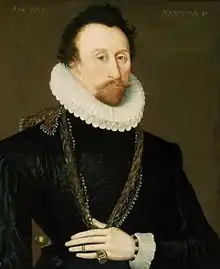
Hawkins house is named after Sir John Hawkins (1532–1595).[15] Hawkins house is the newest house, established in the academic year 2006–2007. Its creation was mainly due to headmaster Roy Pike's wishes for class sizes to be reduced across the school. Although the newest house, it has put in strong performances, and in the past three academic years has secured a second and two third place finishes in the annual house competition. Its house colour is purple, and the current Hawkins Head of House is Mrs V Pellant.
Ralegh house
Ralegh house is named after Sir Walter Raleigh (1552–1618).[16] Raleigh is one of the original four houses and its house colour is red. The current Ralegh Head of House is Mr A Brown.[17]
Centenary
To celebrate the school's centenary in 2004, the school decided to create a new theatre and hall, which was completed in 2007 and staged its first production, Joseph and the Amazing Technicolor Dreamcoat, in early May of that year. The hall was officially opened in March 2008 by The Earl of Wessex,[18] and named the 'Cavanna Centenary Hall' in recognition of donations from local business the Cavanna Group.
Notable members of staff
Notable former pupils
- Martin Turner, rock musician, Wishbone Ash
- Raymond Cattell, psychologist[20] Pioneer of psychometric testing
- Neil Collings[21]
- Ben Howard, Musician[22]
- Chris Read, cricketer who played as wicket-keeper for the England cricket team
- Hiley Edwards (1951–2009), cricketer who played for and captained Devon County Cricket Club
- Richard Leaman CB OBE, CEO of The Guide Dogs for the Blind Association and former senior Royal Navy officer
- Ted Luscombe, Bishop of Brechin 1975-90, Primus of the Scottish Episcopal Church 1985-1990
- Terence Frederick Mitchell (1919-2007), Professor of Linguistics and Phonetics, University of Leeds.
- Harry Robinson, World War II veteran and Distinguished Service Order (DSO) recipient[23]
- Adrian Sanders, Liberal Democrat MP for Torbay, between 1997 and 2015.[24]
- Professor David Southwood, Science Director of the European Space Agency, President of the Royal Astronomical Society, Head of Physics Department Imperial College.
- Bill Strang CBE, Chief Engineer from 1960-7, and Technical Director from 1967-71 at the British Aircraft Corporation (BAC), and hence headed the design team of Concorde (with Lucien Servanty) as its UK Technical Director from 1966-77[25]
- Roger Deakins, Academy Award-winning Cinematographer.
- Yorick Wilks Pioneer Professor of Artificial Intelligence applied to language processing on a computer.
- Chris Lintott Professor of Astrophysics in the Department of Physics at Oxford University and The Sky at Night presenter.[26]
- Alex Fletcher, professional footballer for Plymouth Argyle.
- Sam Skinner (rugby union), professional rugby union player for Exeter Chiefs and Scotland national rugby union team.
- Matt Hickey, first-class cricketer
References
- "Establishment: Torquay Boys' Grammar School". EduBase2. Department for Education. Retrieved 21 December 2012.
- Revealed — real-life heroism of 'Godfrey'
- http://www.tbgs.co.uk/docs/torquin/torquin_2012.pdf%5B%5D - accessed 9 December 2012
- http://www.guardian.co.uk/education/2011/feb/22/headteachers-legends-schools-staying-put - accessed 9 December 2012
- The Torquay Boys' Grammar School Observatory
- https://www.bbc.co.uk/news/special/education/school_tables/secondary/11/html/eng_maths_880.stm?compare=
- Further Mathematics Network
- Junior Challenge 2007 Archived 15 March 2012 at Archive.today
- Business Competition Archived 5 September 2008 at the Wayback Machine
- Torquay Boys' Grammar School - Pastoral Overview Archived 11 September 2012 at Archive.today
- Torquay Boys' Grammar School - Blake House Archived 1 November 2007 at Archive.today
- Torquay Boys' Grammar School - Davys House
- Torquay Boys' Grammar School - Frobisher House Archived 1 November 2007 at Archive.today
- Torquay Boys' Grammar School - Gilbert House Archived 9 May 2008 at the Wayback Machine
- Torquay Boys' Grammar School - Hawkins House Archived 1 November 2007 at Archive.today
- Torquay Boys' Grammar School - Ralegh House
- "Ralegh". www.tbgs.co.uk. Archived from the original on 3 July 2017. Retrieved 2 May 2017.
- "Prince Tells Students to Take Up Challenge", Herald Express, 4 March 2008, retrieved 14 May 2008.
- Hindmarch, Sonali (7 July 2006), "Inspirational tales as teachers of the year are announced", SecEd, retrieved 14 May 2008.
- Sheehy, Noel (2003), Fifty Key Thinkers in Psychology, London: Routledge, p. 61.
- Western Morning News
- "Torquay Herald Express". Archived from the original on 15 December 2014. Retrieved 11 December 2014.
- "Obituaries - Major Harry Robinson". Daily Telegraph. 3 July 2011.
- Waller, Robert; Criddle, Byron (1999), The Almanac of British Politics, London: Routledge, p. 692.
- William Strang
- Chris Lintott